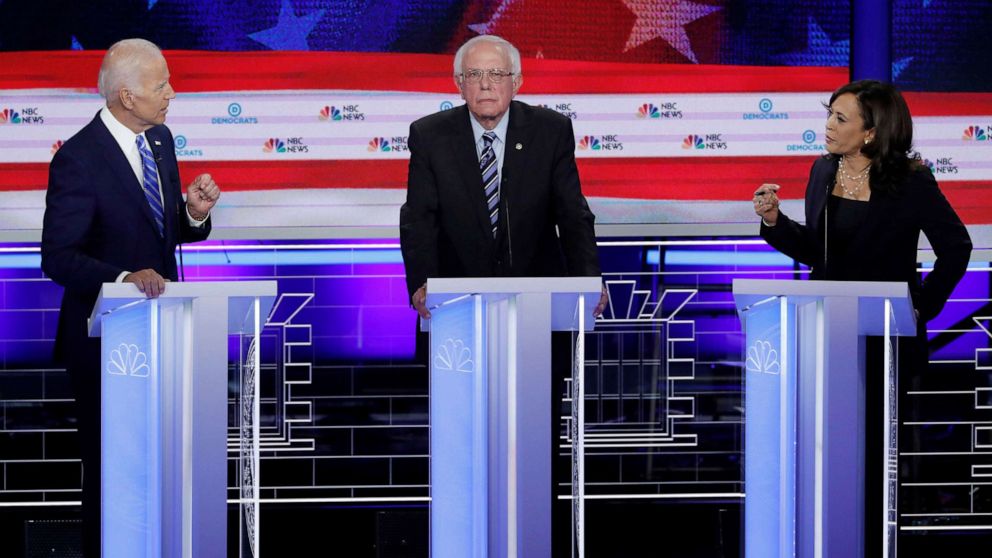All 10 qualifying candidates to share debate stage for 1st time in Democratic primary
For the first time during the 2020 Democratic primary, every candidate who has qualified for the Democratic National Committee debates will share the same stage, descending upon Houston Thursday for the debate hosted by ABC News and Univision.
Ten candidates qualified for the third debate, which had stricter qualifying requirements set by the DNC earlier this year: former Vice President Joe Biden, Sen. Cory Booker, South Bend, Ind. Mayor Pete Buttigieg, former Housing and Urban Development Secretary Julián Castro, California Sen. Kamala Harris, Minnesota Sen. Amy Klobuchar, former Texas Rep. Beto O'Rourke, Vermont Sen. Bernie Sanders, Massachusetts Sen. Elizabeth Warren and entrepreneur Andrew Yang.
"I think having all of the candidates on stage, knowing that one of the people on that stage will go on to be the nominee brings a new level of clarity and energy to the debates," Buttigieg said in New Hampshire Sunday. "I'm looking forward to the opportunity to both communicate the shared values that we have -- all have in common. And to explain why my plans, and not just my style, are simply different from the other candidates."
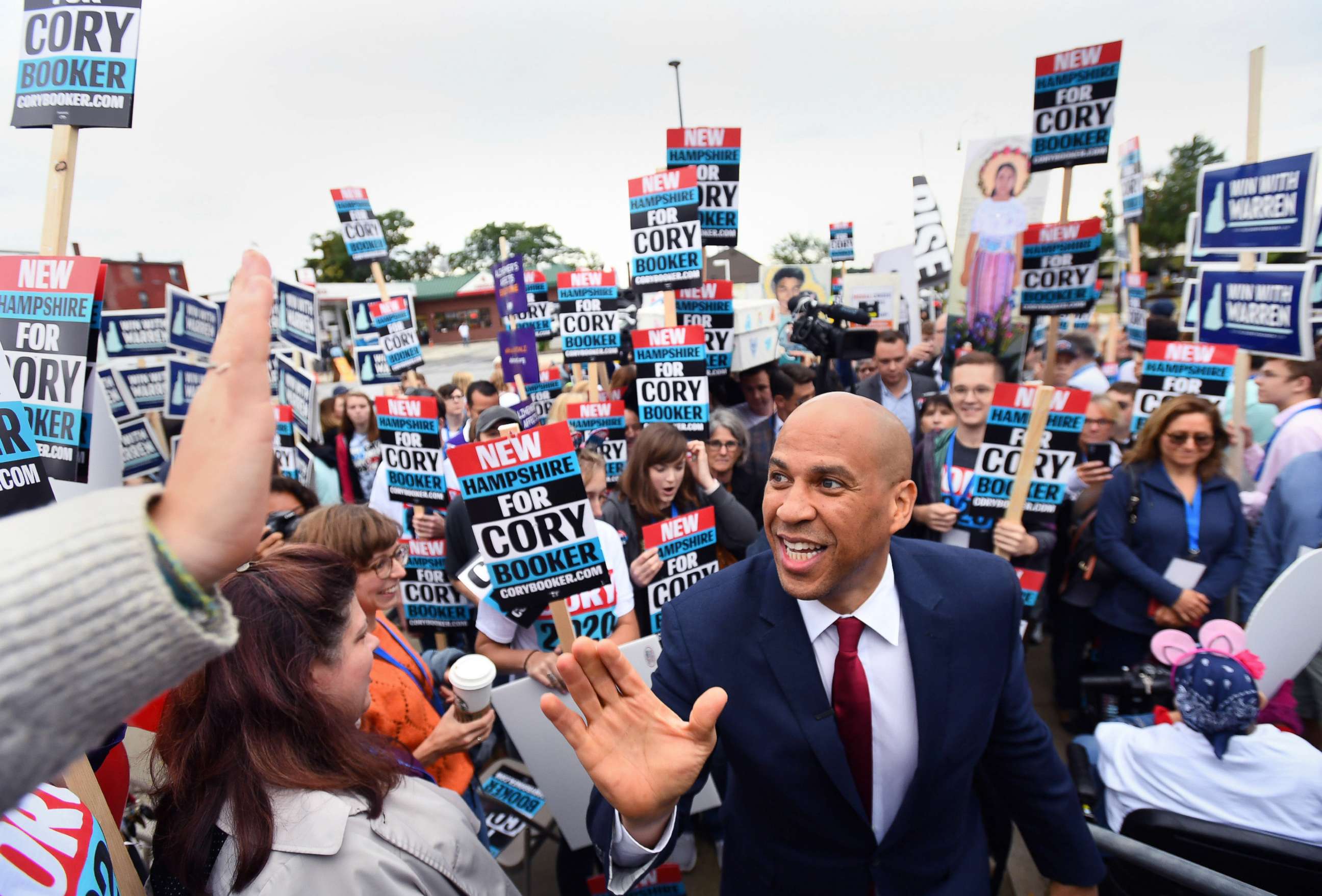
Booker said it will be a "more exciting debate stage to do the top 10 of us in this campaign," but while he said he's done a lot of "intense preparation," he wouldn't go into specifics.
"You will be seeing my bald head," he joked to ABC News Saturday. "I'm not going to give you away my strategies, techniques, tactics, or what to expect. I'm not going to show my hand at cards."
On "This Week" Sunday, ABC News contributor Rahm Emanuel said this debate is the first time voters will "have a chance to measure people not on a split screen."
"They're going to see each other and take their temperature, take their character, lift the hood up, check the oil, check the tires. ... Single night, one stage, and you get to get the measure of the candidates," Emanuel, the former mayor of Chicago and former chief of staff to President Barack Obama, said, adding that the candidate who reaches out to voters, as opposed to going after his or her competitors on stage, will do well in this debate.
"The person that appreciates, understands, and puts themselves most comfortably, based on their own history, where the voters have lived their lives, that's going to be the candidate that shines over not only this debate, but over the long term," he said.
The third debate is being held at Texas Southern University, a public, historically black university, and airs from 8 p.m. to 11 p.m. ET. It is the first time Biden and Warren, two of the early front-runners, will appear on the same stage, positioned right next to each other.
Asked by ABC News if that new match-up changes her approach going into the debate, Warren said, "Not really."
"The way I see this is this is a chance to talk to people all across the country about how we've got a government that works great for the wealthy and the well connected, just not working for everyone else. And we got a chance to change that in 2020," she said Sunday.
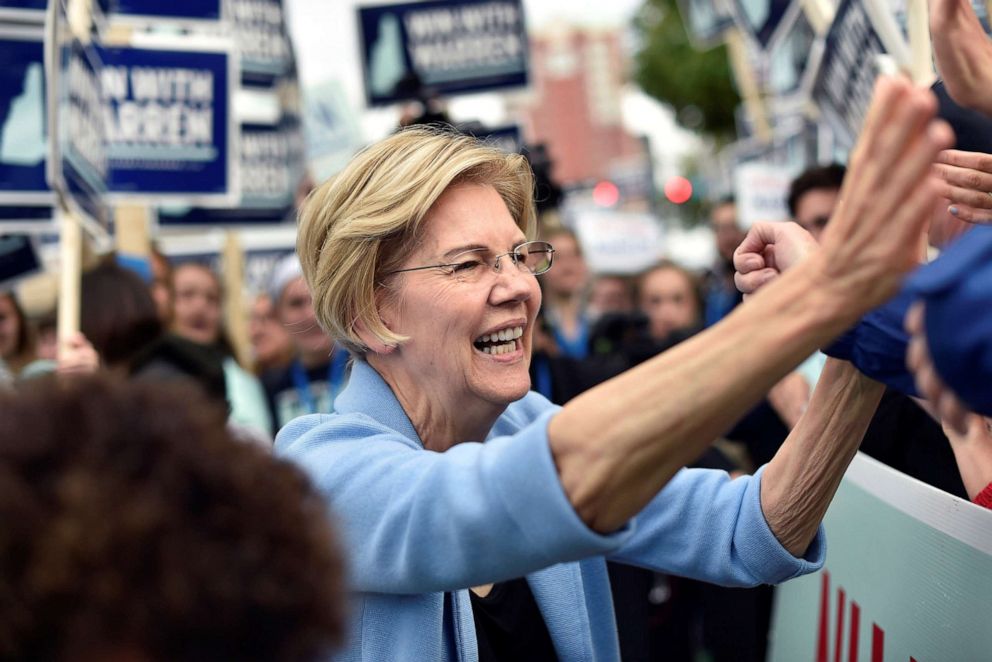
Similarly, Biden said Friday that Warren and Sanders flanking his sides "will be a good thing." The former vice president added that he's "never had to break through" the crowded field, and told ABC News he's looking forward to the debate.
ABC News political analyst Matthew Dowd said that Biden and Warren "would be better off not attacking each other and trying to rise above the fray, and deflecting attacks of others."
And while many are anticipating how those two will interact, Dowd said that the pressure is on Sanders: "He hasn’t seemed to figure out his competition is not Biden, but it is Warren."
Former New Jersey Gov. Chris Christie, now an ABC News contributor, said that of the candidates on stage Thursday, Harris is under the most pressure.
"She had this quick rise, because she took a shot at Biden. She realized in the second debate that you do that, there's going to be incoming. And now she's kind of in no man's land, in my view," he said on "This Week." "I think she's the person who has the most pressure on her, because her donors are going to be looking at her and going, all right, are we going anywhere or aren't we?"
Harris, however, downplayed poll numbers during a press gaggle in New Hampshire Saturday, saying, "I'm not riding polls like everybody else, and the pundits can ride polls. I'm not on that roller coaster. I am working hard, we are steady. I don't get high with the polls, I don't go low with the polls."
On ABC News' "Powerhouse Politics" podcast on Wednesday, ABC News contributor and former Sen. Heidi Heitkamp, D-N.D., said this debate can be an opportunity for lower-polling candidates, like Castro, Klobuchar and Yang.
"Narrowing the field really helps those people who are polling below 5% to maybe catch a little bit more attention than they would if they were standing with 20," she said.
Regardless of what the candidates' message or strategy is, though, Christie offered this reality check for everyone on stage: "Eight minutes total is what you're going to get to speak. So you better know what the hell you want to say."
Amid criticism from certain candidates who didn't qualify for September's debate, DNC Chairman Tom Perez defended the debate qualifying process during an interview on "This Week" Sunday, calling 2% support in four qualifying polls "a very reasonable bar," and adding that the process "has been the most fair, transparent, inclusive process in the history of the Democratic primary."
"Our field is deep. But we're reaching a point now where voters are differentiating. And that's what it's about. And candidates have to demonstrate progress as we get closer and closer to Iowa and New Hampshire," he said.
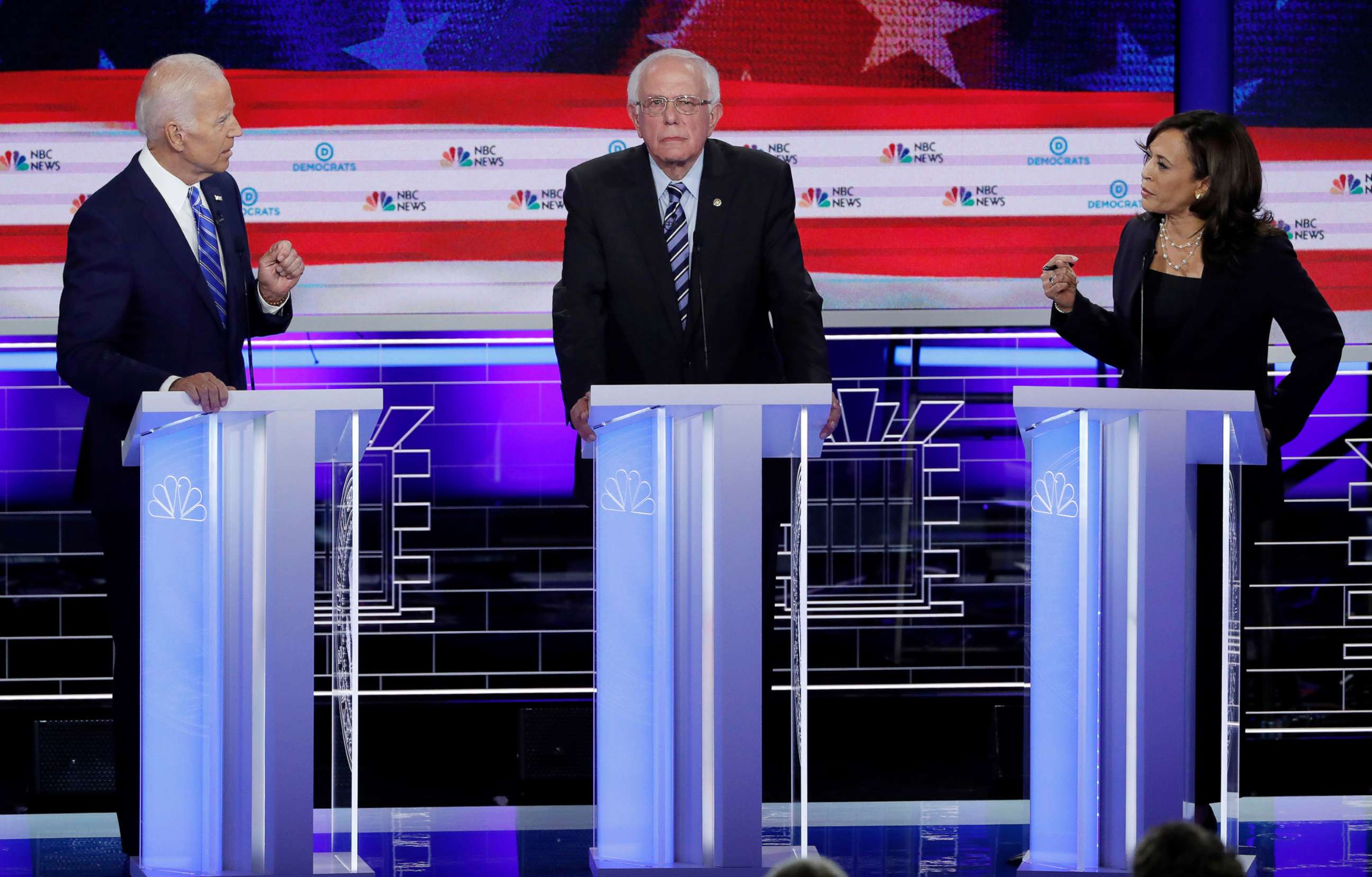
Ahead of the first round of debates in June and July, the candidates already knew what the DNC's qualifying requirements were for September and October -- but ahead of this round, the candidates are still in the dark about what they'll need to achieve to make the stage for the last two debates of 2019, the dates for which have yet to be announced.
Perez said Sunday that "obviously, we will continue to raise the bar of participation because that's what we've always done," but he did not specify just how much the bar would be raised.
Though several candidates dropped out of the race ahead of this debate, half of the now 20-person field still won't be on stage, and some have openly recognized the setback their absence could have on their campaigns.
New York City Mayor Bill de Blasio said he'll reevaluate his campaign on Oct. 1, the deadline to acquire four early state or national qualifying polls with 2% support and attain at least 130,000 individual donors. According to an ABC News analysis, de Blasio hasn't gotten a single qualifying poll for this round of debates.
"I think it's absolutely right to say the debates have been among the most important parts of this campaign -- they've kind of been the Main Street of this campaign so far for all the candidates. ... So I would have loved to been in the September debates. But I think if I can't get into September, my goal is to get into October," the mayor said Saturday during a press gaggle at the New Hampshire Democratic Party Convention. "We've seen candidates miss one debate and get in the next debate. I think there's time to do it."
However, Montana Gov. Steve Bullock, who often touts his campaign's selling point as him being the only Democratic candidate to win a statewide election in a state President Donald Trump also won in 2016, brushed off the importance of the primary debates.
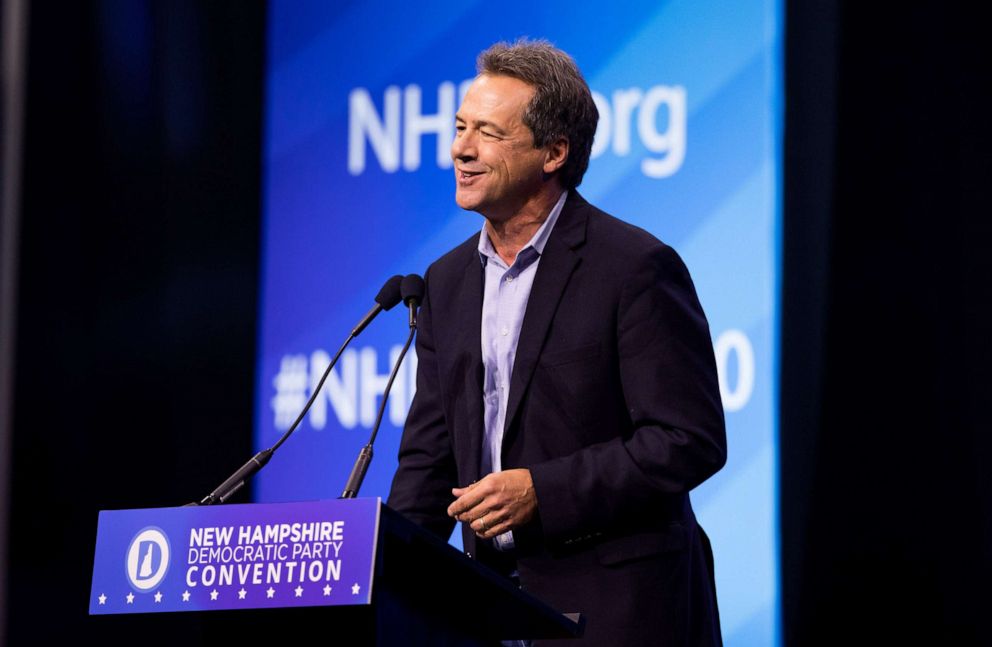
"While there's a lot of pressure to try to turn around and say this election is all about the debates, I think this election is actually all about the voters of New Hampshire and Iowa and South Carolina and Nevada. I think it'll narrow down the big field. And I'll continue to do exactly what I'm doing," Bullock told ABC News during an exclusive in-flight interview from New Hampshire to Washington.
One candidate guaranteed a second chance at debating is Tom Steyer, the billionaire financier who was the last Democrat to enter the race in early July. According to an ABC News analysis, on Sunday, Steyer secured the last poll he needed to qualify for the October debates, which are being held in Ohio on Oct. 15 and 16. Since the DNC had previously said no more than 10 candidates can be on stage on a single night, with Steyer qualifying, viewers should expect October's debate to span two nights again since all 10 candidates participating in ABC's debate Thursday have qualified for October as well.
Another candidate with a strong shot at qualifying for October is Hawaii Rep. Tulsi Gabbard. She has already secured the donor threshold, according to her campaign, and she needs two more qualifying polls before the deadline, according to an ABC News analysis. Although Gabbard is claiming to have three polls after securing 2% support among Democrat or Democratic-leaning registered voters in the latest ABC News/Washington Post poll released Sunday, the DNC told ABC News that the responses they are counting from that poll are among all Democrat or Democratic-leaning Americans, and Gabbard received only 1% support among that group.
ABC News' Armando Garcia, Justin Gomez, Cheyenne Haslett, Beatrice Peterson, Sasha Pezenik, Rachel Scott, Zohreen Shah and John Verhovek contributed to this story.
